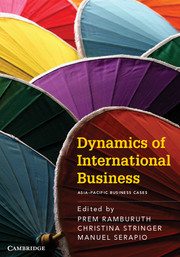Book contents
- Frontmatter
- Dedication
- Foreword
- Contents
- Contributors
- Preface
- Part I The Environment of International Business
- Part II Strategy and Entrepreneurship in International Business
- 6 Dewak: The positioning and growth of a born global software firm from a developing country
- 7 Qingdao Applied Chemistry Company (Kingking): Pivoting into a new global strategy
- 8 Bangkok Dusit Medical Services Public Company Limited: Healthy international expansion
- 9 The growth and internationalisation of Geely – the Chinese car manufacturer
- 10 Parking Creators International
- 11 Tasty Southern Seeds
- 12 Introducing innovations in education: The Ateneo Graduate School of Business
- Part III Managing People in International Business
- Part IV Operating in International Markets
- References
6 - Dewak: The positioning and growth of a born global software firm from a developing country
Published online by Cambridge University Press: 05 August 2013
- Frontmatter
- Dedication
- Foreword
- Contents
- Contributors
- Preface
- Part I The Environment of International Business
- Part II Strategy and Entrepreneurship in International Business
- 6 Dewak: The positioning and growth of a born global software firm from a developing country
- 7 Qingdao Applied Chemistry Company (Kingking): Pivoting into a new global strategy
- 8 Bangkok Dusit Medical Services Public Company Limited: Healthy international expansion
- 9 The growth and internationalisation of Geely – the Chinese car manufacturer
- 10 Parking Creators International
- 11 Tasty Southern Seeds
- 12 Introducing innovations in education: The Ateneo Graduate School of Business
- Part III Managing People in International Business
- Part IV Operating in International Markets
- References
Summary
We are not so interested in our home market [Colombia] because it is not very attractive related to profit and experience. Being in international markets provides us with more experience – experience regarding competitiveness. Our international market experience makes us look more attractive, more competitive. It is very different to do business with foreigners than with nationals. For instance, you have to deal with another language [English] and then there is the importance of punctuality. Here they are more relaxed concerning deadlines. The culture is very different. The learning we experience internationally definitely makes us more competitive.
– Carlos Orozco, General Manager of Dewak, 2010Introduction
In February 2008, following the insolvency of their former employer (a small software company), Andres, Carlos, Daniel, Diego and Nicolas suddenly found themselves unemployed. They met for coffee in one of Medellín’s shopping malls to discuss their future careers. Considering their educational and professional backgrounds in systems engineering and informatics, they decided to focus on a software business.
Andres, Carlos, Daniel, Diego and Nicolas started to work as a team of freelancers for Kayako customisation services. While working for their former employer, they had gained exposure to the open-source customer-support solutions of Kayako. Nevertheless, the business opportunity of customisation services for Kayako solutions was never exploited, due to the insolvency of their former firm.
- Type
- Chapter
- Information
- Publisher: Cambridge University PressPrint publication year: 2013



